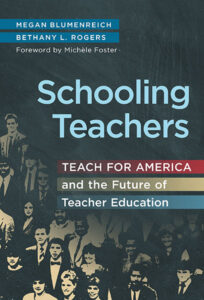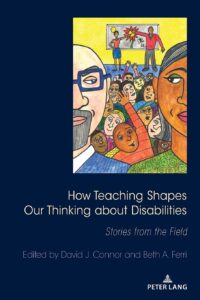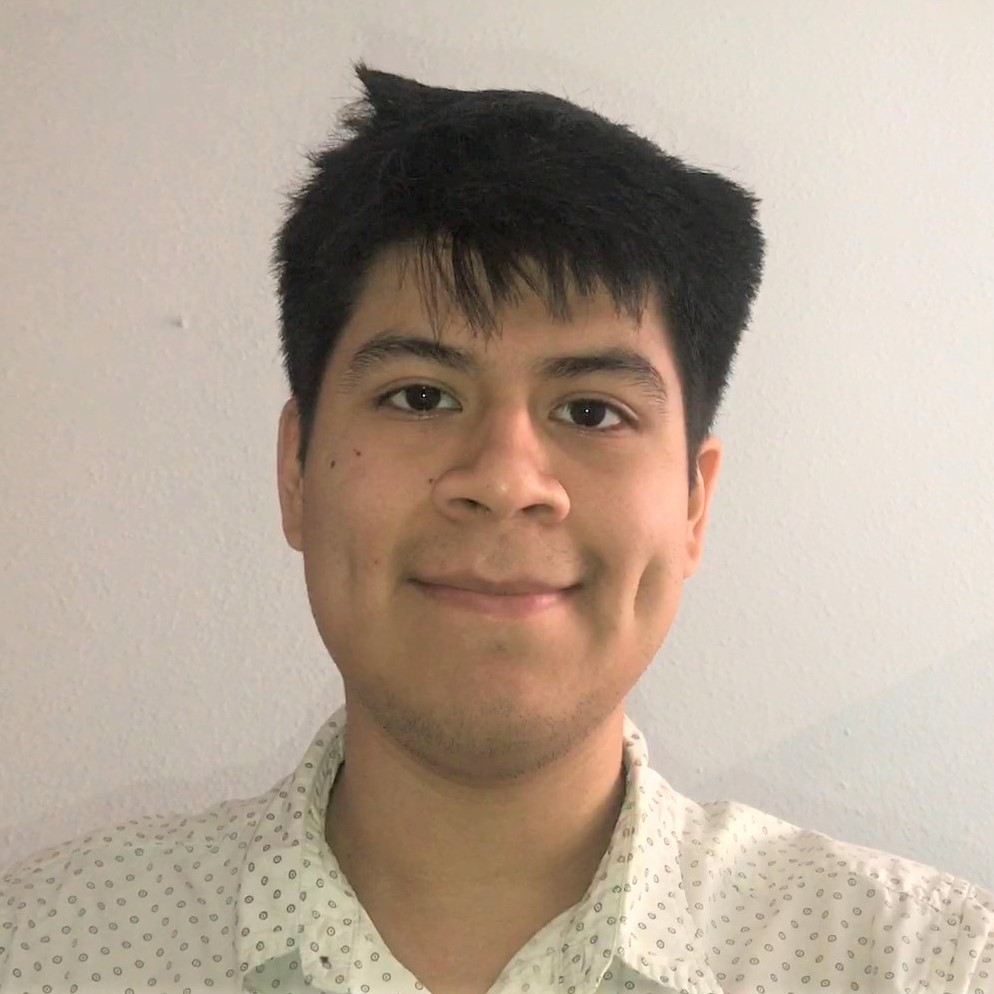As the City College School of Education celebrates and reflects on its centennial, a book and chapter written by a pair of faculty professors, Dr. Megan Blumenreich and Dr. Jan. W. Valle also reflects on several aspects of their careers to make sense of their paths to becoming education professors.
 Schooling Teachers: Teach For America and the Future of Teach Education (Teachers College Press) by Dr. Megan Blumenreich, co-authored by Dr. Bethany L. Rogers, Associate Professor of Education at the College of Staten Island, focuses on how the United States will attract and prepare high-quality teachers for all students. The book draws on the oral histories of 30 participants from the inaugural 1990 cohort of Teach For America, a very influential alternative credentialing program. This book situates their experiences within the larger context of teacher education and reform of the last three decades. Through this investigation, the authors examine the “teacher problem” and illustrate why solutions remain elusive and limited.
Schooling Teachers: Teach For America and the Future of Teach Education (Teachers College Press) by Dr. Megan Blumenreich, co-authored by Dr. Bethany L. Rogers, Associate Professor of Education at the College of Staten Island, focuses on how the United States will attract and prepare high-quality teachers for all students. The book draws on the oral histories of 30 participants from the inaugural 1990 cohort of Teach For America, a very influential alternative credentialing program. This book situates their experiences within the larger context of teacher education and reform of the last three decades. Through this investigation, the authors examine the “teacher problem” and illustrate why solutions remain elusive and limited.
For 30 years, the organization has recruited college graduates from prestigious universities, placing them in school districts with underserved students. Teach For America remains polarizing to many educators—those in favor of the program credit it with raising interest in the field of education, and those opposed to the program have concerns such as having children who need the most care being taught by new teachers who lack preparation and pedagogical knowledge.
I was a 1990 TFA corps member myself, later taught in different settings and studied education, became a teacher educator. In many ways this book is about making sense of my professional life… I wrote it with Bethany Rogers, who is a historian of education, and uses the past to make sense of the current time-period. — Dr. Bluemenreich
Dr. Blumenreich’s career in education began with teaching middle school in Compton, California for three years, and she sees the book as an opportunity to reflect on her dual-role presence as a Teach For America alum and college-based teacher educator. After teaching in Compton, she went on to run an educational program in Washington Heights and completed her master’s and doctorate in Curriculum and Instruction at Teachers College, Columbia University. “I got into education through Teach For America, taught in different settings, then studied education and became a teacher educator, so I feel like I represent two camps of the arguments of university-based teacher education and the alternatives.”
After discussing the experiences and challenges of the 30 oral history participants, the book widens its lens to examine the ways in which the broader field of teacher education has been challenged by and has responded to the alternatives in the field and to address the legacy of Teach For America.
Schooling Teachers: Teach For America and the Future of Teach Education partly reveals that the program affected participants’ appreciation and advocacy for public education. Some, like Dr. Blumenreich, became educators through formal schooling while others assumed educational leadership roles.
In contrast, Dr. Valle’s chapter “How I Got Here from There: The Road to Disability Studies in Education” is a personal account of her time in college to the turn of the century that led to her involvement in Disability Studies in Education (DSE). It is a relatively new field that originated in 1999 from a critique on the medical model of disability that looks for learning deficits rather than strengths and how it affects both dialogue and perception from the public and media and advocated for reform.
 Dr. Valle’s invited chapter, “How I Got Here from There: The Road to Disability Studies in Education” appears in How Teaching Shapes Our Thinking about Disabilities: Stories from the Field (Peter Lang, 2021), edited by Dr. David J. Connor and Dr. Beth A. Ferri. This volume connects practice and research through autoethnographic memoirs of 20 well-known scholars and teacher educators in the field of disability studies in education (established as an academic discipline in 1999.)
Dr. Valle’s invited chapter, “How I Got Here from There: The Road to Disability Studies in Education” appears in How Teaching Shapes Our Thinking about Disabilities: Stories from the Field (Peter Lang, 2021), edited by Dr. David J. Connor and Dr. Beth A. Ferri. This volume connects practice and research through autoethnographic memoirs of 20 well-known scholars and teacher educators in the field of disability studies in education (established as an academic discipline in 1999.)
Each author contributes highly personal stories about their respective experiences as special education teachers (K-12) throughout diverse decades and educational contexts. Common to all stories is early recognition of the deficit model and discourse in special education as highly problematic, eventually forming the basis for each scholar’s future research focus on access and equity for students with disabilities.
Where in the world did mainstream teachers get the idea that supporting students with disabilities was an individual choice? My collaborative attempts could be accepted or discarded at will. Teachers referred to our mutual students as “Jan’s Kids” as if I were running an educational telethon. In their view, “special” students belonged with “special” teachers who bore sole responsibility for their education. (As I was told repeatedly, “I did not go into teaching to teach special education. Not my job.”) — Dr. Valle
In her chapter, Dr. Valle traces a career trajectory from a college student questioning the ethics of abnormal psychology to becoming a special education teacher the year that special education law is mandated in public schools (with rather predictable resistance from many general education teachers at the time) to founding a private school for dyslexic students to working at a progressive developmental pediatric center on a multidisciplinary team as an educational evaluator and parent advocate. In the telling of her story, she makes clear how her attraction as a graduate student to the emerging field of disability studies in education (DSE) connects to and illuminates her practitioner experiences as well as contributes to her ongoing development of new theoretical models reflecting DSE practice and policies.
From the vantage point of the present, I understand how profoundly my multiple iterations as a practitioner define my current work as a teacher educator and scholar. Over the past four decades, I have been following an ongoing desire to make sense of the educational institutions created to serve students with disabilities and their families as well as the larger cultural understandings of disability that influence and support such structures. DSE provided the lens through which to better understand how students with disabilities and their families experience societal responses to disability and the consequences those responses represent in their lives. I will be forever grateful for the opportunity to learn from and work alongside this community of scholars and look forward to continuing our collective work. — Dr. Valle

Edgar Llivisupa is a journalist based in New York who joined the RICC in May 2021. Currently a Journalism and Spanish major at Baruch College he has covered business, science, culture and transit, in addition to living in Spain for two years to improve his Spanish proficiency.